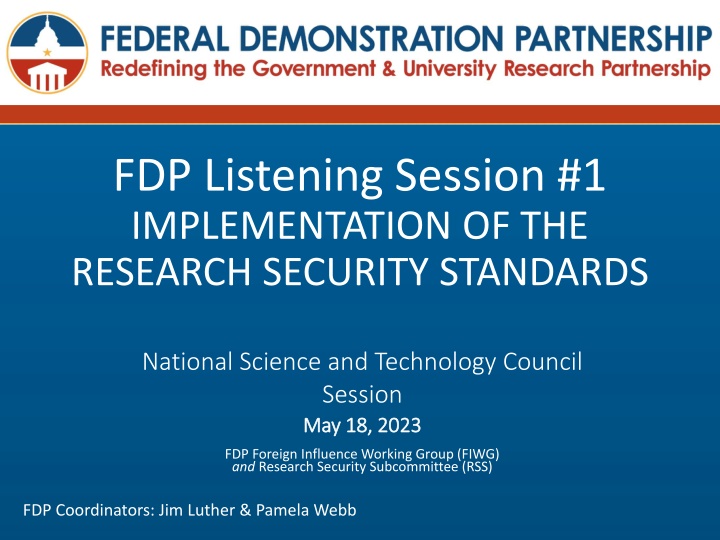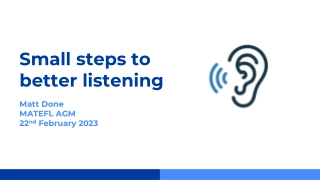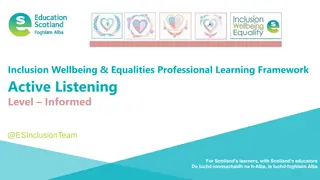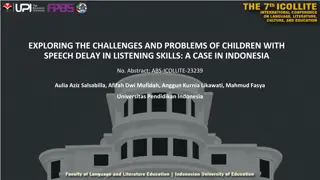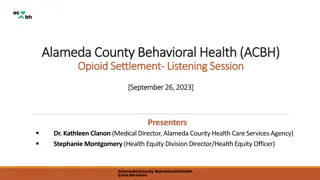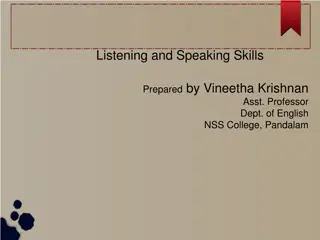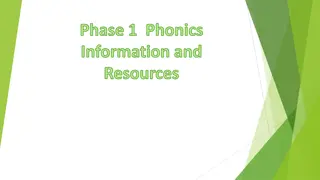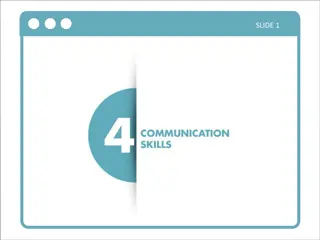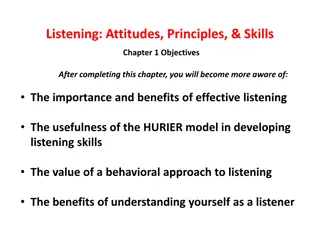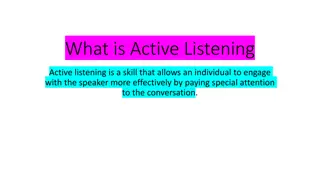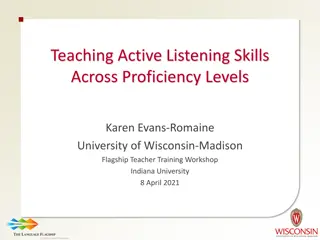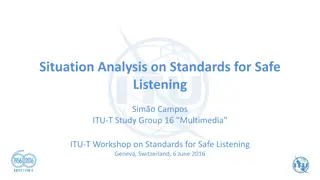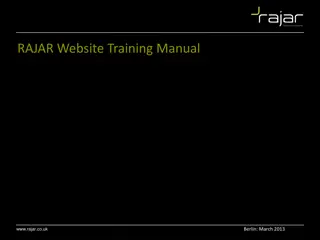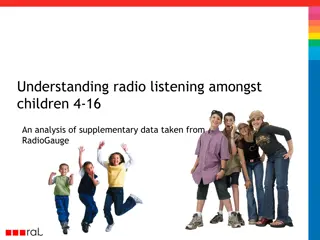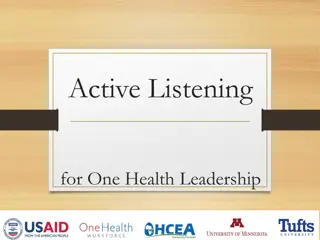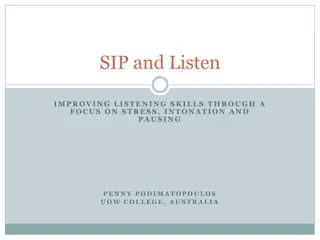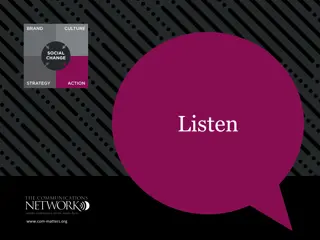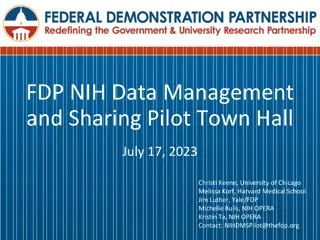FDP Listening Session #1
This session focuses on sharing preliminary insights on key Research Security Standards topics and exploring mutual interest in creating an FDP pilot for effective implementation of standards. By leveraging the FDP-Federal Partnership, the session aims to clarify and harmonize guidance, reduce burden, establish implementation timeframes, and evaluate cost implications.
Download Presentation

Please find below an Image/Link to download the presentation.
The content on the website is provided AS IS for your information and personal use only. It may not be sold, licensed, or shared on other websites without obtaining consent from the author.If you encounter any issues during the download, it is possible that the publisher has removed the file from their server.
You are allowed to download the files provided on this website for personal or commercial use, subject to the condition that they are used lawfully. All files are the property of their respective owners.
The content on the website is provided AS IS for your information and personal use only. It may not be sold, licensed, or shared on other websites without obtaining consent from the author.
E N D
Presentation Transcript
FDP Listening Session #1 IMPLEMENTATION OF THE RESEARCH SECURITY STANDARDS National Science and Technology Council Session May 18, 2023 May 18, 2023 FDP Foreign Influence Working Group (FIWG) and Research Security Subcommittee (RSS) FDP Coordinators: Jim Luther & Pamela Webb
Session Agenda Session Agenda Introductions Listening Session Overview and Objective Sessions Discussions and Associated Q&A Next Steps
Federal Participants Federal Participants Dr. Rebecca Keiser, Chief of Research Security Strategy & Policy (NSF) Kei Koizumi, Principal Deputy Director for Policy (OSTP) Dr. Harriet Kung, Deputy Director for Science Programs (DOE) Dr. Michael Lauer, Deputy Director, Extramural Research (NIH) Dr. Cole Donovan (OSTP) Michelle Bulls, Director, OPERA (NIH) Jean Feldman, Head, Policy Office (NSF) Sara Stalker-Lehoux, Deputy Chief, Research Security Strategy & Policy (NSF)
FDP Member Session Contributors FDP Member Session Contributors Susan Anderson, College of Charleston Lynette Arias, University of Washington Doug Backman, University of Central Florida Pam Caudill, Yale University Robin Cyr, Northeastern University Amanda Humphrey, Northeastern University Jim Luther, Yale University and FDP (Session Coordinator) Laura McCabe, Michigan State University Lisa Nichols, University of Michigan Lori Schultz, University of Arizona Lindsay Spangler, Duke University Mark Sweet, University of Wisconsin-Madison Pamela Webb, University of Minnesota (Session Coordinator) Shandra White, University of Michigan Alice Young, Texas Tech University
Session Objective Session Objective Objective: Share some preliminary insights on the key Research Security Standards topics Explore mutual interest in creating an FDP pilot aimed at furthering effective implementation of the standards once released. Continuing this dialogue through the unique FDP-Federal Partnership will allow us to leverage the benefits of a Pilot Demonstration to: Clarity and harmonization: Support clarity and harmonization of guidance across agencies as well as institutional consistency Burden: Reduce agency and institutional burden by sharing best practices Implementation and enforcement timeframe: Develop an implementation and enforcement timeframe that supports the effective execution of the federal guidance and appropriate risk management. Cost Implications: Evaluate cost implications from a joint agency and institutional perspective.
FDP Pilot Objectives FDP Pilot Objectives - - PROPOSED PROPOSED Development, Demonstration, & Sharing of Effective Practices Multi-directional feedback throughout implementation from/to Federal Partners Research Institutions Ability to directly get feedback from diverse institutions: large/small, public/private, higher education/research institutes, ERIs and HBCUs Ability to receive direct feedback from Faculty
Topics Topics Topic #1 Foreign Travel Security Topic #2 Training Topic #3 Risk-Based Approaches to Implementation and Research Security Program Self-Assessment Topic #4 Implementation Considerations at Institutions RESERVED Topic #5 Cybersecurity Topic #6 Export Controls
Implementation Sequence Implementation Sequence Research Security Standards Research Security Standards Development of How-To Training Learning Mngt System Technology Cycle Evaluation of adequacy and fit of NSF developed training materials Hiring and Training of New Staff $ Budget Cycle $ Structure of Research Security Office Evaluation of Final Standards Creation of Research Security Office Development of Supporting Processes & Internal Controls Monitoring and Assessment of Processes to Ensure Effectiveness Development of Policies & Procedures Creation of Service Centers to support Direct Charge, as applicable Leadership Vetting & Approval Culture Change
Topic #1 Topic #1 Foreign Travel Security Foreign Travel Security Challenges Inconsistent definitions for covered individuals and travel Decentralized environment for travel at grantee institutions Authorization is a significant departure from current culture, policy, process Mandatory security briefings Confusing language on applicability to devices used on Federal R&D Implications for institutional resources to support with technology, personnel
Topic #1 Topic #1 Foreign Travel Security Foreign Travel Security Suggestions Clarify definitions and remove inconsistencies Allow a risk-based approach to how an institution implements disclosure and authorization of foreign travel, including when/how to conduct security briefings Define expectations for security briefings Specifically exclude personal travel
Topic #2 Topic #2 Training Training Challenges Matching training requirements/expectations with documented needs Reconciling research security training with RECR Timing of initial deployment of research security training Other timing challenges Newly added individuals Refresher training Training updates Understanding who must be trained
Topic #2 Topic #2 Training Training Suggestions Authorize a risk-based approach for deciding who needs to receive what kind of training Expand user testing of NSF modules Decide how RECR training best fits in Ensure harmonization across federal agencies Definitions Who needs to be trained under what circumstances Define high-risk topics and codify when risk levels change Work together (agencies and institutions) to create an institutional assessment checklist
Topic #3 Topic #3 Risk Implementation & Research Security Program Self Implementation & Research Security Program Self- - Assessment Assessment Risk- -Based Approaches to Based Approaches to Challenges The Standards do not currently include any reference to tiers or categories of risk Without guidance on what constitutes high risk institutions will be more likely to either: Pull back from international collaboration; or Identify more collaborations as high risk, adding to burden No criteria is articulated in the Standards for what constitutes an effective program, leaving institutions and government agencies with less of a roadmap for evaluating program efficacy
Topic #3 Topic #3 Risk Implementation & Research Security Program Self Implementation & Research Security Program Self- - Assessment Assessment Risk- -Based Approaches to Based Approaches to Suggestions Promote flexible, risk-based approaches to applying the Standards Offer guidance on tiers or categories of risk Clarify definitions and expectations Case studies would be particularly effective Create criteria for what constitutes an effective program Sample assessments Cross-walk of the standards (how does the government see the standard vs. institutions) Mutual understanding of expectations
Topic #4 Topic #4 - - Implementation Implementation Considerations at Institutions Considerations at Institutions Challenges Many of the proposed elements of the standards are sequential in nature to implement and have numerous dependencies Widespread intra-institutional coordination involving multiple offices and hierarchical levels will be required for many institutions to be able to successfully implement the Standards. Budget (and Technology). Cycles in higher education frequently require long-lead times; Hiring & training new staff will have long lead times. NSF developed training programs will likely be the what but institutions will need to develop the how Development and deployment of supporting policies, procedures and supporting internal controls takes time. Harmonizing the final research security standards with other parts of NSPM-33 requirements will also require time.
Topic #4 Topic #4 - - Implementation Implementation Considerations at Institutions Considerations at Institutions Suggestions Utilizing a risk-based approach to many of the Standards will help institutions more quickly get their Research Security Program up-and- running since it would likely be able to operate with fewer new policies, staff, and resources. Use FDP to implement a Pilot that would support: Development, Demonstration, & Sharing of Effective Practices Multi-directional feedback throughout implementation from/to federal partners and a variety of research institutions (large/small, public/private, higher education/research institutes, ERIs and HBCUs) Ability to get direct feedback from Faculty. Evaluate the implementation & enforcement timeline to ensure that the traditional institutional cycles (budget, technology development, training, hiring, culture change, etc.) have adequate time to develop the necessary resource support mechanisms.
Implementation Sequence Implementation Sequence Research Security Standards Research Security Standards Development of How-To Training Learning Mngt System Technology Cycle Evaluation of adequacy and fit of NSF developed training materials Hiring and Training of New Staff $ Budget Cycle $ Structure of Research Security Office Evaluation of Final Standards Creation of Research Security Office Development of Supporting Processes & Internal Controls Monitoring and Assessment of Processes to Ensure Effectiveness Development of Policies & Procedures Creation of Service Centers to support Direct Charge, as applicable Leadership Vetting & Approval Culture Change
Implementation Sequence Implementation Sequence Research Security Standards Standards Research Security Development of How-To Training Learning Mngt System Technology Cycle Evaluation of adequacy and fit of NSF developed training materials Hiring and Training of New Staff Budget Cycle Structure of Research Security Office Evaluation of Final Standards Creation of Research Security Office Development of Supporting Processes & Internal Controls Policy/Procedure Policy/Procedure Development, Development, Vetting, Vetting, Approval, & Approval, & Implementation Implementation Cycle Cycle Monitoring and Assessment of Processes to Ensure Effectiveness Development of Policies & Procedures Creation of Service Centers to support Direct Charge, as applicable Leadership Vetting & Approval Culture Change
Implementation Sequence Implementation Sequence Research Security Standards Standards Research Security Development of How-To Training Learning Mngt System Evaluation of adequacy and fit of NSF developed training materials Technology Cycle Hiring and Training of New Staff Budget Cycle Structure of Research Security Office Evaluation of Final Standards Creation of Research Security Office Development of Supporting Processes & Internal Controls Training Training Evaluation, Evaluation, Development & Development & Implementation Implementation Cycle Cycle Monitoring and Assessment of Processes to Ensure Effectiveness Development of Policies & Procedures Creation of Service Centers to support Direct Charge, as applicable Leadership Vetting & Approval Culture Change
Continuing this dialogue through the unique FDP-Federal Partnership will allow us to leverage the benefits of a Pilot Demonstration to: Clarity and harmonization: Support clarity and harmonization of guidance across agencies as well as institutional consistency Burden: Reduce agency and institutional burden by sharing best practices Implementation and enforcement timeframe: Develop an implementation and enforcement timeframe that supports the effective execution of the federal guidance and appropriate risk management. Cost Implications: Evaluate cost implications from a joint agency and institutional perspective.
Next Steps Next Steps Evaluate Potential for Pilot How else can the unique FDP Institution-Federal Colleague partnership be of value? REMINDER: May 25th, In-person FDP Meeting Science & Security Session June 13th Listening Session #2 (Demo of Risk assessment tool, Potential pilot for disclosure forms in SciENcv, & potential initiative about NSF's collaborators and other affiliations form)
